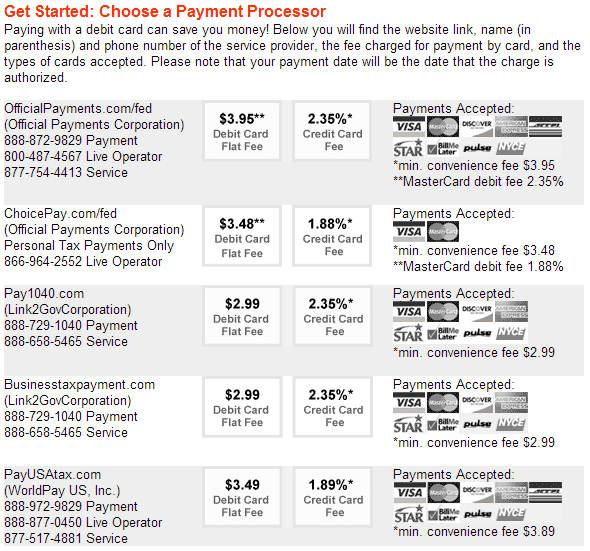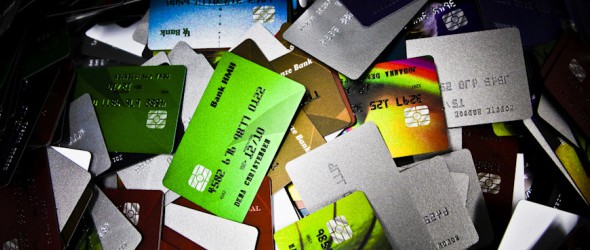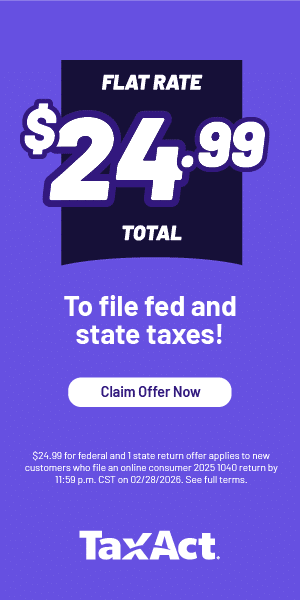These days almost everyone accepts plastic, including the IRS. Thanks to the Taxpayer Relief Act of 1997, the federal government accepts income tax payments by “any commercially acceptable means,” which includes debit and credit cards. But just because you can do something, it doesn’t necessarily mean you should. More often than not, paying your taxes with a credit card isn’t the smartest choice.
The Expense?
When you buy something with a credit card, the merchant incurs a fee which is typically 1.5% to 3% of the purchase price. Normally, this is an expense that you – the consumer – will never see, since the merchant eats it as a cost of doing business. Now do you think Uncle Sam will do the same? Fat chance. The IRS makes you pay for the expense of processing your card payments. The good news is that they’ve negotiated fees that are well below what most businesses have to pay. The bad news is that these fees are still quite high. There are five licensed processors and here’s what they charge:  So in the best case scenario, you’re going to be paying at least 1.88% of the amount. That might be palatable if you only owe a couple hundred bucks, but if you’re paying thousands of dollars that fee can be a lot of money. In the worst case scenario, not only will you be paying that fee, but you’re also be paying interest on your credit card (if you’re naughty and carry it as a balance). But if you have no other choice, most people would probably say it’s better to be indebted to Chase or American Express than the intimidating IRS!
So in the best case scenario, you’re going to be paying at least 1.88% of the amount. That might be palatable if you only owe a couple hundred bucks, but if you’re paying thousands of dollars that fee can be a lot of money. In the worst case scenario, not only will you be paying that fee, but you’re also be paying interest on your credit card (if you’re naughty and carry it as a balance). But if you have no other choice, most people would probably say it’s better to be indebted to Chase or American Express than the intimidating IRS!
The Rewards?
On the bright side, paying with credit can earn you cash-back, airline miles, or other card rewards. But will the value of those exceed the processing fees? Usually not, but it is possible. Some cards give you rewards that are worth 2%, but not many. You can count all of them on one hand; Capital One Venture, Fidelity American Express, Priceline Rewards Visa, and the Capital One Spark Cash for business. If you use one of those, then it’s possible to come out ahead but not by much. Unfortunately with most other cash-back cards, you will only earn 1%, so those will be a losing proposition. The same holds true for most airline credit cards, since the miles will rarely be worth 2 cents each. In fact, sometimes they’re worth less than a penny a piece! For example, the Delta SkyMiles program is infamously known as “SkyPesos” in frequent flyer circles, because award flights sometimes require a lot more miles than the standard 25,000 you pay with most other carriers. Another possible scenario where you may come out ahead is by using a signup promotion for a new card. Many will offer you bonus points or cash if you spend a certain amount within the first 90 days of opening the account. For example, you may have to spend $3,000 within your first 3 months in order to score the bonus. For some of us, our normal credit card spending might not be high enough for that. But if you charge your taxes to the card, that might put you across the finish line. Sure, you’re still paying the processing fees, but that may be worth it if you’re getting a free airline ticket or a nice sum of cash in return.
Conclusion? You should probably stick with checks
Except for a few circumstances, it’s probably not going to make a lot of sense to pay with credit. Rather than pay those hefty processing fees, consider using checks or ACH (electronic checks). Another good alternative is debit cards since those involve a reasonable flat-rate fee of just a few bucks. If you’re lucky enough to have a debit card with rewards, keep in mind that you don’t earn rewards on PIN-based transactions, which unfortunately is what your tax payments will be. Photo credit: marsmet543 via photopin cc





